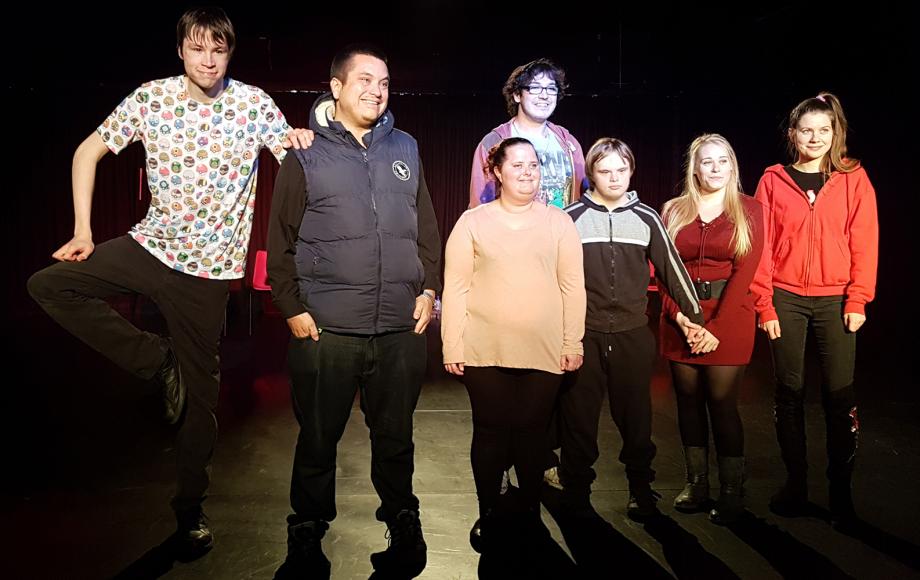The Cultural Pathways programme aimed to develop and test a new route into employment for adults with learning disability through work placements and creative arts intervention.
Funded by Hampshire Adult Services and managed in partnership by Hampshire Cultural Trust (HCT) and Ways into Work CIC (WIW), the project was delivered between October 2017 and January 2018 at museums and arts venues in the New Forest and Rushmoor.
Weekly workshops, led by Bearface Theatre, used drama, role play and creative techniques to enhance participants’ personal development and employability skills. The 13-week work placements at HCT venues provided on-the-job training and practical experience to prepare individuals to achieve their employment goals.
The Cultural Pathways project succeeded in developing and testing a new approach to supporting adults with learning disability to achieve their employment goals. Through a programme of individual work placements, and drama workshops, it has created a framework that uses creative arts methods and cultural venues to help individuals enhance their self-confidence and social skills to prepare for the job market. Despite low numbers at some locations, the majority of participants completed the programme.
Case studies illustrate how individuals gained in self-confidence, the ability to deal with mental health issues, and in one case resulted in a job. Feedback from host venue managers indicates strong support for the programme and a willingness to participate in similar future initiatives. The partnership between Hampshire Cultural Trust and Ways Into Work has been seen as mutually beneficial and offers the potential for future collaborations.
Case Studies
1. Amy: 13-week work placement at the café in the Forest Arts Centre in New Milton. Amy had expressed that she lacked confidence and had anxiety issues. She had initially been very nervous about working in the café in such a customer-facing role and was unsure about how she would cope. During one particular incident as she served some customers, Amy was able to assess the situation and respond in an appropriate manner to resolve it to the satisfaction of the customer. The supervising staff member had noted that Amy had stayed calm throughout and handled the situation efficiently and politely. Following this, Amy reported that she was particularly pleased with her reaction and found that it gave a boost to her confidence. By the end of the placement, Amy noted that she enjoyed her work there. “I love the staff … I like working behind the bar. I never thought, I literally did not think that I would be able to serve people on my own and just do it. That was just really scary at first. But I’m just doing it now.” [Quote from film]
2. Scott: Work placement at the West End Centre in Aldershot. Scott was initially placed in the Box Office which was a customer-facing role taking bookings. However, his personality and interests made this an unsuitable match for him, causing difficulties for other members of staff. A manager identified that Scott’s particular skills and attention to detail were better suited to data entry type tasks. This worked more successfully and at the end of the placement Scott found employment at another organisation working in data entry.
3. Lucy: Participated in group drama workshops held at the Forest Arts Centre and led by Kate from Bearface Theatre. Lucy was one of the performers in the play resulting from the collaborative process. In the video documenting this activity, Lucy gave feedback on what her participation meant to her: “It’s just shown me that I do like drama. … It’s given me more structure to my week which is better for me and my mental health. All the things we do which is about talking, being heard, that’s improved me a lot because I’m quite shy … It’s given me more confidence to stand up and say stuff.” [Quote from film]
4. Nicola: Participated in the group drama workshops at Forest Arts Centre. Nicola had been shy and anxious about taking part in drama-based activities because of negative experiences at school before. By the end she had performed in the play and was keen to perform in a school to demonstrate that she could do it.
Feedback
“It was great to be involved in the project as this was a good challenge for my staff members and gave them experience of working one on one with people with learning disabilities and helping to train them. It was also good to know that we could help our placement gain some experience and confidence in working.” [Amy, Milestones Museum]
“The low numbers had benefits and drawbacks. I was able to give more focused attention on individuals but the participants often felt self-conscious with all the attention and refused to join in certain activities. But because of the more individual focused approach I really did see a lot of progression with confidence to speak and perform.” [Craig, Bearface Theatre]
“The group grew in confidence and in ability to work with one another. A huge nurturing atmosphere was fostered and I believe the participants had great opportunity to find their natural acting styles and devise a piece together to account for this.” [Kate, Bearface Theatre]
“The project was of huge benefit to me as a practitioner, I was able to discover other people’s stories and we were able together to look at creative ways of telling those stories and how we can positively progress from them (when relevant). We were able to openly discuss anxiety and its crippling nature, depression, emotional well-being and hope, and operating in a safe creative space with much laughter and support.” [Kate, Bearface Theatre]

